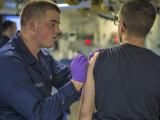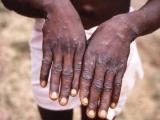Apr 15, 2004 (CIDRAP News) – Ten US military personnel were found to be HIV-positive after they received smallpox shots in 2003, but they were not harmed by the vaccine, according to a new online report in Clinical Infectious Diseases.
The US military and civilian smallpox vaccination programs exclude HIV-infected people because the vaccinia virus in the vaccine can cause serious complications in those with impaired immunity. The soldiers escaped harm probably because their immune systems had not yet been seriously compromised by HIV, according to the report.
"Fundamentally, it is because their immune systems were not yet impaired or diminished or compromised, because they were presumably early in their infection," said Col. John Grabenstein, PhD, senior author. "This is one of those cases where the distinction between HIV-positivity and AIDS is apparent." Grabenstein was quoted in a news release from the Infectious Disease Society of America (IDSA), publisher of Clinical Infectious Diseases.
The 10 soldiers, all men, were among more than 483,000 who were vaccinated between December 2002 and October 2003. The report says that to be vaccinated, all the personnel were required to have an up-to-date negative HIV test result, generally meaning within the preceding 2 years.
The 10 service members had positive HIV test findings before or within 3 weeks after receiving a smallpox shot, "but neither the patients nor the vaccine administrators were aware of the positive test result at the time of vaccination," the article states. "In most cases, the vaccinators erred by assuming that 'no news was good news' when the HIV test result was not available."
All 10 men had a normal "take," or major reaction, to the shot, with normal healing of the lesion and no unusual side effects, according to the article. Three of the group had never had a smallpox shot before, and the other seven either were known to have had the shot or were likely to have had it because they were born before 1972. Previous vaccinees, the report notes, may have some residual immunity to vaccinia, making complications less likely when they are vaccinated again.
After their test results were received, the 10 soldiers underwent HIV evaluations, which found them to be asymptomatic. Their mean CD4 T cell count was 483 cells per cubic millimeter. The report says the risk of vaccinia complications is likely to be low for HIV-positive people with CD4 cell counts greater than 200 cells per cubic millimeter.
The authors say their findings should be "somewhat reassuring" to public health planners, but they should be interpreted cautiously because most of the men had been vaccinated before and none had full-blown AIDS.
The IDSA statement said the study raises the question whether HIV-infected people should receive smallpox shots. If they don't, they could be highly vulnerable in case of a terrorist release of smallpox virus, but if they do, they could become ill or even die from the vaccine.
Grabenstein commented in the news release, "In the absence of any cases of smallpox in the world, vaccination programs should take care to exempt HIV-positive people from vaccination." But he added that a smallpox outbreak might make the benefits of the vaccine outweigh the risks. He noted that weakened forms of the smallpox vaccine may become available and make vaccination safer for immunocompromised people in the future.
Tasker SA, Schnepf GA, Lim M, et al. Unintended smallpox vaccination of HIV-1-infected individuals in the United States military. Clin Infect Dis 2004 May 1;38(9):1320-2 [Full text]



















